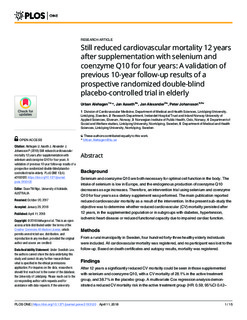Still reduced cardiovascular mortality 12 years after supplementation with selenium and coenzyme Q10 for four years: A validation of previous 10-year follow-up results of a prospective randomized double-blind placebo-controlled trial in elderly
Peer reviewed, Journal article
Published version
Permanent lenke
http://hdl.handle.net/11250/2589063Utgivelsesdato
2018Metadata
Vis full innførselSamlinger
Sammendrag
Selenium and coenzyme Q10 are both necessary for optimal cell function in the body. The intake of selenium is low in Europe, and the endogenous production of coenzyme Q10 decreases as age increases. Therefore, an intervention trial using selenium and coenzyme Q10 for four years as a dietary supplement was performed. The main publication reported reduced cardiovascular mortality as a result of the intervention. In the present sub-study the objective was to determine whether reduced cardiovascular (CV) mortality persisted after 12 years, in the supplemented population or in subgroups with diabetes, hypertension, ischemic heart disease or reduced functional capacity due to impaired cardiac function. Methods From a rural municipality in Sweden, four hundred forty-three healthy elderly individuals were included. All cardiovascular mortality was registered, and no participant was lost to the follow-up. Based on death certificates and autopsy results, mortality was registered. Findings After 12 years a significantly reduced CV mortality could be seen in those supplemented with selenium and coenzyme Q10, with a CV mortality of 28.1% in the active treatment group, and 38.7% in the placebo group. A multivariate Cox regression analysis demonstrated a reduced CV mortality risk in the active treatment group (HR: 0.59; 95%CI 0.42–0.81; P = 0.001). In those with ischemic heart disease, diabetes, hypertension and impaired functional capacity we demonstrated a significantly reduced CV mortality risk. Conclusions This is a 12-year follow-up of a group of healthy elderly participants that were supplemented with selenium and coenzyme Q10 for four years. Even after twelve years we observed a significantly reduced risk for CV mortality in this group, as well as in subgroups of patients with diabetes, hypertension, ischemic heart disease or impaired functional capacity. The results thus validate the results obtained in the 10-year evaluation. The protective action was not confined to the intervention period, but persisted during the follow-up period. The mechanisms behind this effect remain to be fully elucidated, although various effects on cardiac function, oxidative stress, fibrosis and inflammation have previously been identified. Since this was a small study, the observations should be regarded as hypothesis-generating. Still reduced cardiovascular mortality 12 years after supplementation with selenium and coenzyme Q10 for four years: A validation of previous 10-year follow-up results of a prospective randomized double-blind placebo-controlled trial in elderly
